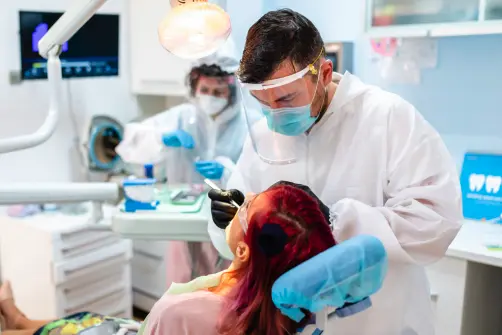Oral cancer is the sixth most common cancer, accounting for nearly 5 percent of all cases. Close to 53,000 Americans are expected to be diagnosed with oral or pharyngeal cancer this year. It is expected to cause more than 9,750 deaths, killing roughly 1 person per hour, 24 hours per day, according to The Oral Cancer Foundation.
Oral cancer is particularly dangerous because it can go unnoticed in its preliminary stages. In many cases, however, general dentists can detect the disease early, which makes the dental community the first line of defense against oral cancer. Read on to learn more about oral cancer and why it’s crucial to talk with your general dentist immediately if you believe that you are experiencing any symptoms.

What are the warning signs of oral cancer?
Oral cancer typically is painless in its early stages but can become painful as it spreads. Go to your dentist immediately if you observe any of the following: changes in the way your teeth fit together; oral sores that bleed easily or don’t heal; lumps, thickening, rough spots, or crusty or eroded areas in the mouth; or difficulty swallowing, chewing, speaking, or moving the jaw or tongue.
How do dentists screen for cancer?
During an oral cancer screening, your dentist will feel for lumps or irregular tissue changes in your neck, head, cheeks and oral cavity. He or she also will examine the soft tissues in your mouth, looking for sores or discolored tissues. He or she also may use screening devices that use rinses, dyes or different types of lights to detect abnormal cells. It’s important to remember that your dentist does not necessarily think you have oral cancer if he or she performs a screening. An oral cancer screening is part of a routine dental checkup, even when you have no symptoms.
An oral cancer screening is part of a routine dental checkup, even when you have no symptoms.
How is oral cancer treated?
Methods of treatment for oral cancer include surgery, radiation therapy and/or chemotherapy. This treatment is determined in conjunction with your physician.
What are the risk factors for oral cancer?
Risk factors for oral cancer include tobacco use, alcohol use, sun exposure (lips), previous head and neck cancer diagnosis and human papilloma virus (HPV) infection. HPV can cause cancer in the back of the throat (oropharyngeal cancer), including the base of the tongue and tonsils.
How can I prevent oral cancer?
To help prevent oral cancer, abstain from using all forms of tobacco, and avoid excessive sun exposure and alcohol consumption. Additionally, the Centers for Disease Control and Prevention recommends that all preteen boy and girls ages 11 to 12 should be vaccinated for HPV, which may aid in reducing the risk of oral cancer. The vaccines also are recommended for males and females ages 13 to 26 if they haven’t received them already.
Because successful treatment and rehabilitation of oral cancer are dependent upon early detection, it is extremely important to regularly check your mouth for any changes and to maintain regular dental visits, at least every six months.
© COPYRIGHT 2020 BY THE ACADEMY OF GENERAL DENTISTRY. ALL RIGHTS RESERVED.